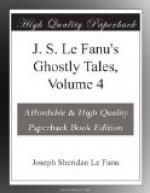This intimacy did not redound to the prosperity or reputation of the convivial allies. Bob Martin drank a good deal more punch than was good for his health, or consistent with the character of an ecclesiastical functionary. Philip Slaney, too, was drawn into similar indulgences, for it was hard to resist the genial seductions of his gifted companion; and as he was obliged to pay for both, his purse was believed to have suffered even more than his head and liver.
Be this as it may, Bob Martin had the credit of having made a drunkard of “black Phil Slaney”—for by this cognomen was he distinguished; and Phil Slaney had also the reputation of having made the sexton, if possible, a “bigger bliggard” than ever. Under these circumstances, the accounts of the concern opposite the turnpike became somewhat entangled; and it came to pass one drowsy summer morning, the weather being at once sultry and cloudy, that Phil Slaney went into a small back parlour, where he kept his books, and which commanded, through its dirty window-panes, a full view of a dead wall, and having bolted the door, he took a loaded pistol, and clapping the muzzle in his mouth, blew the upper part of his skull through the ceiling.
This horrid catastrophe shocked Bob Martin extremely; and partly on this account, and partly because having been, on several late occasions, found at night in a state of abstraction, bordering on insensibility, upon the high road, he had been threatened with dismissal; and, as some said, partly also because of the difficulty of finding anybody to “treat” him as poor Phil Slaney used to do, he for a time forswore alcohol in all its combinations, and became an eminent example of temperance and sobriety.
Bob observed his good resolutions, greatly to the comfort of his wife, and the edification of the neighbourhood, with tolerable punctuality. He was seldom tipsy, and never drunk, and was greeted by the better part of society with all the honours of the prodigal son.
Now it happened, about a year after the grisly event we have mentioned, that the curate having received, by the post, due notice of a funeral to be consummated in the churchyard of Chapelizod, with certain instructions respecting the site of the grave, despatched a summons for Bob Martin, with a view to communicate to that functionary these official details.
It was a lowering autumn night: piles of lurid thunder-clouds, slowly rising from the earth, had loaded the sky with a solemn and boding canopy of storm. The growl of the distant thunder was heard afar off upon the dull, still air, and all nature seemed, as it were, hushed and cowering under the oppressive influence of the approaching tempest.
It was past nine o’clock when Bob, putting on his official coat of seedy black, prepared to attend his professional superior.
“Bobby, darlin’,” said his wife, before she delivered the hat she held in her hand to his keeping, “sure you won’t, Bobby, darlin’—you won’t—you know what.”




